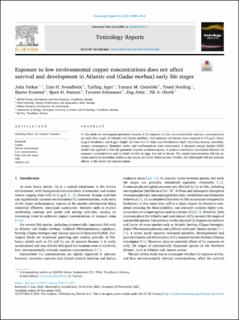Exposure to low environmental copper concentrations does not affect survival and development in Atlantic cod (Gadus morhua) early life stages
Farkas, Julia; Svendheim, Linn Hjelmeland; Jager, Tjalling; Ciesielski, Tomasz Maciej; Nordtug, Trond; Kvæstad, Bjarne; Hansen, Bjørn Henrik; Kristensen, Torstein; Altin, Dag; Olsvik, Pål Asgeir
Peer reviewed, Journal article
Published version

Åpne
Permanent lenke
https://hdl.handle.net/11250/2982122Utgivelsesdato
2021Metadata
Vis full innførselSamlinger
Originalversjon
Farkas, J., Svendheim, L. H., Jager, T., Ciesielski, T. M., Nordtug, T., Kvæstad, B., Hansen, B. H., Kristensen, T., Altin, D. & Olsvik, P. A. (2021). Exposure to low environmental copper concentrations does not affect survival and development in Atlantic cod (Gadus morhua) early life stages. Toxicology Reports, 8, 1909-1916. doi: 10.1016/j.toxrep.2021.11.012Sammendrag
In this study we investigated potential impacts of Cu exposure at low, environmentally relevant, concentrations on early live stages of Atlantic cod (Gadus morhua). Cod embryos and larvae were exposed to 0.5 μg/L (low), 2 μg/L (medium), and 6 μg/L (high) Cu from 4 to 17 days post fertilisation (dpf). Hatching success, mortality, oxygen consumption, biometric traits, and malformations were determined. A dynamic energy budget (DEB) model was applied to identify potential impacts on bioenergetics. A positive correlation was found between Cu exposure concentrations and Cu body burden in eggs, but not in larvae. The tested concentrations did not increase mortality in neither embryos nor larvae, or larvae deformations. Further, the DEB model did not indicate effects of the tested Cu concentrations.
